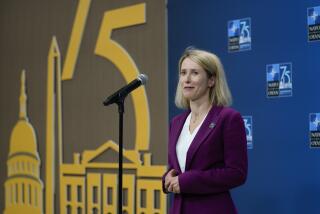Estonia Finds Consolation in EU Hopes
- Share via
TALLINN, Estonia — Like the unlucky loser in a beauty pageant, this Baltic republic--excluded from the first round of NATO expansion--has won the consolation prize of promised talks on joining the European Union.
The announcement that Estonia, together with four other East European nations plus Cyprus, was being marked for early membership in the world’s most powerful economic bloc is being seen here as the best thing to happen to this country since it won independence from Moscow in 1991.
At his 10th-floor office overlooking Tallinn’s Germanic old town, Estonian Foreign Minister Toomas Ilves hailed the day as ultimate recognition that this republic, which was enslaved by Communists for half a century, belongs firmly in the Western camp. “You could say that, as of today, we can no longer be considered an ex-Soviet republic,” an enthusiastic Ilves said just hours after confirmation came from Brussels on Wednesday.
Ilves said the decision by the executive commission of the EU, which is still subject to final approval in December, was also recognition that Estonia’s market reforms were a success. “This is like getting an A in school,” said Ilves, smiling broadly. “Estonia has put up with the toughest shock therapies in Europe, and it paid off.”
*
But the decision to include this nation of 1.5 million was hardly a foregone conclusion. Estonians say many EU officials had a tendency to lump them in with the basket cases of post-Communist reform, such as Albania and Uzbekistan. Now that the decision’s been made, however, hopes are high here that the vote of confidence from the EU will draw even more investment and spur even greater growth, already hovering at a respectable 5%.
Others say the real plus in getting into the EU has less to do with economics than with security.
Estonian officials say the North Atlantic Treaty Organization and the EU are separate processes and--despite objections by Russia to Baltic members of NATO--they insist that they are as committed as ever to someday entering the U.S.-led alliance.
But Estonians have also been saying for years that enmeshing themselves with the West was a key to their long-term national security. And if that is the goal, many observers say it is achieved better with the EU, which interlocks political and economic relations, than with the one-dimensional NATO, which deals with military matters only.
Estonia’s foreign minister said another fringe benefit of the EU invitation could be improved relations with Russia. Estonia already handles tons of Russian transit trade annually. In the EU, Ilves said, his country would have an interest in further improving Russian access to Western markets.
“Russian Czar Peter the Great came to Estonia and said he was hacking open a window to Europe for Russia,” Ilves said. “Estonia is opening the door.”
*
But if bad relations with Russia could improve now that Estonia seems to be on the road to EU membership, good relations with the other two Baltic states may suffer, at least temporarily. Latvian and Lithuanian officials have complained openly that they deserved the nod from Brussels every bit as much as Estonia.
Vytautas Z. Landsbergis, Lithuania’s speaker of parliament, said he worried that Western investment marked for the Baltics could now flow to Estonia simply because it has a stamp of approval from the EU. “We’re happy for Estonia,” said Landsbergis, speaking via mobile phone from a beach on the Lithuanian coast. “But being eliminated from the same starting line as Estonia is a bit unfair.”
While the vast majority of Estonians welcome the news that they now appear to be on the fast track to EU membership, there were misgivings. A minority believes that Estonia should stay out all together, arguing that the EU is too centralized and heavy-handed--too reminiscent of the Soviet network Estonians spent the past five decades trying to escape.
Even ardent EU supporters say the European bloc isn’t market-oriented enough. Estonia stakes claim to having one of the most open trade regimes in the world, and business people here fear that the adoption of thousands of EU-mandated laws and directives could undermine that.
The International Monetary Fund representative to Estonia and Latvia, Dimitri Demekas, says Estonia may face another kind of threat now that it is close to EU membership.
“This could lead to a feeling of overconfidence and complacency,” said Demekas, speaking from the Latvian capital, Riga. “Some Estonians may think that now we have made it and we don’t need to do anything else. They should be careful not to fall into that trap.”
More to Read
Sign up for Essential California
The most important California stories and recommendations in your inbox every morning.
You may occasionally receive promotional content from the Los Angeles Times.













